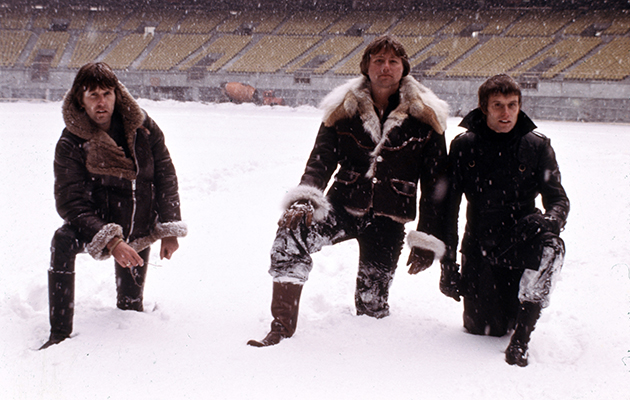PALMER: We tried to reproduce it again, but we never quite got the excitement. I think it was the freshness of getting back together. So we bounced the quarter-inch over to the two-inch multi-track and then started overdubbing it from there. We decided to dub keyboards on top of the multi-track as it was bounced over, and then we dubbed on that bit of extra bass, some cymbals and stuff like that. The microphone was hanging in the middle of the room, so it captured everyone. So the version that was a hit actually started off as a live demo.
LAKE: We felt that it would benefit from the original trumpet fanfare at the beginning. So we put that on, but I think everything else was pretty much as it was. I’m sure the actual body of the record is as it was recorded live.
YOUNG: Then they recorded the album over a period of months, I think the main work on that album was a track called “Pirates”, and it was an epic track. We recorded the orchestra for that in Paris. I remember going to see Leonard Bernstein, and he came to the studio with a few of his friends – he was absolutely blown away by “Pirates”.
LAKE: I was playing an eight-string bass on “Fanfare”. Quite a clever idea, because it was like having a guitar and bass playing simultaneously. And of course Keith also played bass on the keyboard as well – very powerful.
PALMER: Keith was using the Yamaha GX1 at the time, he also had the Moog and we had all the other stuff, yeah – the grand piano, the mini Moog, the [Hammond] L100, the [Hammond] C3.
LAKE: What a wonderful instrument, the GX1. Very unstable and cumbersome, but it had an individual, remarkable sound.
PALMER: The GX1 solo sound was impersonating a harmonica, so that was rather strange, but it seemed to work well. I think we had two GX1s – we had one we bought from John Paul Jones, which we used for spares and things. I was playing a stainless steel set I had at the time, which Ringo Starr ended up having for about 35 years. Greg played with a pick and the strings were always very new, so we got a lot of real good twang from it.
LAKE: I think it may have been Ahmet Ertegun who suggested “Fanfare…” should be a single. I never liked the edited version, though, I always feel it’s like, imagine if you had an oil painting and you cut away the corner, it wouldn’t look so good. But radio play insists on a certain time, and you must conform or your record doesn’t get played.
YOUNG: We had a problem with that track, though, because the American composer Aaron Copland wrote it. I had to call the publishing company, because obviously in those days you had to get permission. They flat refused. They said, “Mr Copland doesn’t want anybody messing with his music.” When I explained that there could be a lot of money in it for Mr Copland, they continued to be derogatory and flatly refused. I managed to get a home number for Mr Copland and I called him up and told him about it, and he was very nice on the phone, and he said, “Look, I really don’t like people jazzing up my music, but I really don’t like the fact that someone makes a decision for me without contacting me. I really don’t like it.” Keith was a bit worried because of the improvised section, he thought he wouldn’t like it. So I sent him the single version and I called him and he said, “Well, I can’t really see why I should approve this, because what this is, is they’ve taken the ‘Fanfare’ and they’ve put a shuffle to it. It’s very nice, but I don’t think so.” So I sent him the full version, and he liked it, he gave approval.
LAKE: Had he not liked it, I think we probably wouldn’t have released it. We wouldn’t have wanted to cause offence, I don’t think. But he really liked the fact that at the end of it we broke out into this improvisation; it was something that his music had inspired, it wasn’t just a reproduction of his notes. I think he found a joy in that.
Order the latest issue of Uncut online and have it sent to your home!



